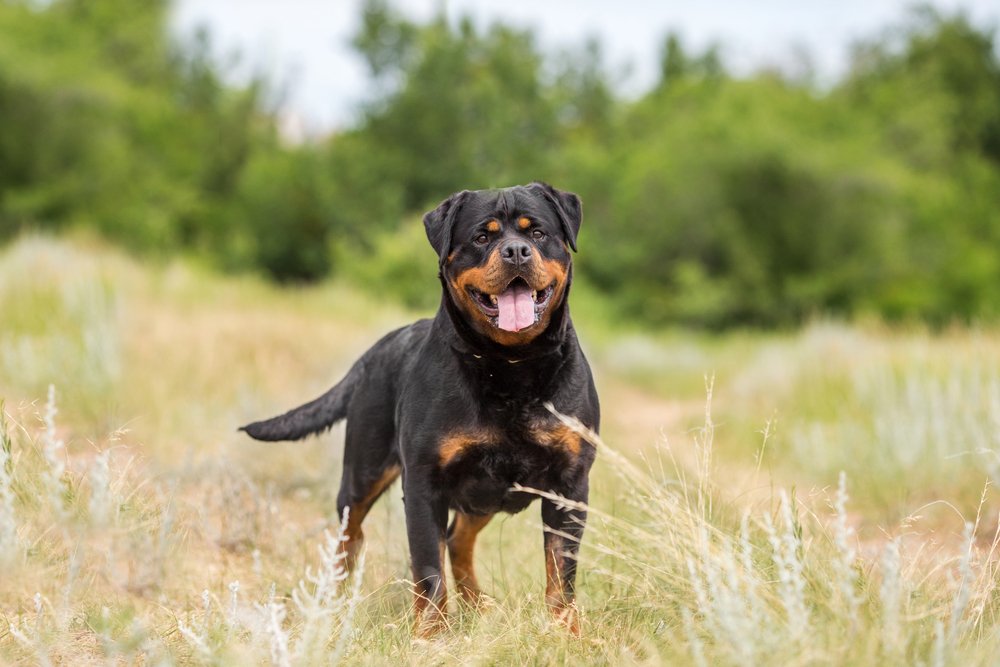Do Rottweilers have lock jaws? It’s a question that often sparks curiosity among dog lovers. Well, let’s dive into the topic and uncover the truth about this popular belief.
Rottweilers are strong and powerful dogs, known for their impressive jaw strength. However, the idea of them having “lock jaws” is more of a myth than a fact. There’s no scientific evidence to support the notion that Rottweilers possess a special mechanism in their jaws that allows them to lock them in place.
So, why do people associate Rottweilers with lock jaws? One possible explanation is their tenacious nature and determination. When they bite down on something, they have a firm grip and won’t easily let go. This misconception might have fueled the belief that their jaws can lock, but it’s simply not true.
So, rest assured, Rottweilers may have powerful jaws, but they don’t possess any mystical ability to lock their jaws. They are stunning, loyal companions with immense love to offer their families. Let’s debunk these myths and appreciate Rottweilers for the incredible dogs they are!

Do Rottweilers Have Lock Jaws? Debunking the Myth
Introduction: Rottweilers are often associated with the misconception that they have lock jaws. This belief stems from their powerful bite and strong jaw muscles. In this article, we will explore the truth behind this myth and provide a comprehensive understanding of the Rottweiler’s anatomy, bite force, and jaw strength. By debunking this common misconception, we aim to shed light on the true nature of these loyal and misunderstood dogs.
The Anatomy of a Rottweiler
Rottweilers have a distinct and powerful build, which contributes to their reputation as strong and protective dogs. Their head is broad and their muzzle is medium in length. When it comes to their jaws, Rottweilers have a normal structure and function that is similar to other dog breeds. They do not possess any special mechanism that would allow them to lock their jaws.
The strength of a Rottweiler’s jaw lies in its muscle mass and bone structure. These dogs have well-developed jaw muscles, allowing them to exert a strong bite force. However, their jaws are not anatomically different from those of other breeds. It’s important to recognize that the perception of “lock jaws” in Rottweilers is a myth, perpetuated by misinformation and exaggeration.
Rottweilers, like all dogs, have a variety of jaw shapes and sizes. Some individuals may have larger or stronger jaws due to genetics or specific training. However, the idea of a Rottweiler being able to lock its jaws is simply not supported by any scientific evidence.
The Bite Force of Rottweilers
When discussing Rottweilers and their jaws, it’s essential to consider their bite force. Rottweilers are known for having a strong bite, thanks to their strong jaw muscles and bone structure. It is estimated that the average bite force of a Rottweiler is around 328 pounds per square inch (PSI). This impressive bite force is comparable to other large dog breeds and can certainly cause damage if not properly controlled.
It’s important to note that a high bite force does not equate to “lock jaws.” Rottweilers, like all dogs, have the ability to open and close their mouths freely. The idea of their jaws locking in place is a fallacy. Their bite force is a natural attribute of their anatomy and does not involve any inherent locking mechanism.
The myth of Rottweilers having lock jaws may have arisen due to their tenacity and determination when they latch onto something. It can be challenging to release a Rottweiler’s bite once they have clenched their jaws, but this is a result of their breed characteristics and training, not a physical locking mechanism in their jaws.
Rottweilers: Gentle Giants
Rottweilers have long been misunderstood and unfairly labeled as aggressive or dangerous dogs. While they are confident and protective by nature, these dogs are also known for their loyalty and gentle disposition. They can be excellent family pets when properly trained and socialized from an early age.
It’s important to approach any dog, including a Rottweiler, with respect and understand their individual personality and temperament. Responsible ownership and training are key to ensuring that a Rottweiler is well-behaved and balanced. By debunking the myth of lock jaws, we hope to contribute to a more accurate understanding of this remarkable breed.
Training Tips for Rottweiler Owners
Key Takeaways: Do Rottweilers Have Lock Jaws?
- Rottweilers do not have a physical lock jaw mechanism.
- The term “lock jaw” is a myth associated with certain dog breeds.
- Rottweilers do have a strong bite force due to their powerful jaw muscles.
- Proper training and socialization are essential to prevent aggressive behavior in Rottweilers.
- Responsible ownership and positive reinforcement can ensure Rottweilers are friendly and well-behaved.
Frequently Asked Questions
Curious about Rottweilers and their jaws? Below are some common questions answered about these strong and powerful dogs.
Are Rottweilers born with lock jaws?
No, Rottweilers are not born with lock jaws. The idea of “lock jaws” is a myth that surrounds certain breeds, including Rottweilers. Rottweilers have strong jaws, but they do not possess any special mechanism that would cause them to lock.
Like other dog breeds, Rottweiler jaws work in a hinge-like motion, allowing them to open and close. They have powerful jaw muscles and a strong bite force, which can be instinctively used for protection or when playing, but their jaws do not have any locking mechanism.
Is it true that Rottweilers have a stronger bite force than other dogs?
Yes, Rottweilers are known to have a strong bite force compared to many other dog breeds. This strength can be attributed to their muscular build and jaw structure. However, it is important to note that bite force can still vary among individual dogs of any breed.
Rottweilers have a bite force of around 328 pounds per square inch (PSI) on average, which is considered high. However, there are other dog breeds, such as the Kangal and the Tosa Inu, that have been recorded to have even stronger bite forces. It is also worth mentioning that a dog’s size and individual traits play a role in their bite force as well.
Do Rottweilers have a higher tendency to bite or exhibit aggressive behavior?
While aggression can be influenced by various factors, including genetics, upbringing, and training, aggression is not a breed-specific trait for Rottweilers. Rottweilers can be loving, loyal, and well-behaved with proper socialization and training.
However, as with any dog breed, it is essential to provide them with proper training, socialization, and care to ensure they grow into well-rounded and balanced dogs. It is also important to remember that individual temperament can vary, and responsible ownership is crucial in preventing any negative behaviors.
Are Rottweilers safe around children?
Rottweilers can be excellent family dogs and are generally good with children when properly socialized and trained. Like any dog breed, it is important to teach children how to interact with dogs, including Rottweilers, in a respectful and safe manner.
Always supervise interactions between young children and dogs, regardless of the breed, to ensure safety for both parties involved. Teaching children about appropriate boundaries and how to treat dogs with kindness and respect is key in fostering a harmonious relationship between Rottweilers and children.
Do Rottweilers make good guard dogs?
Yes, Rottweilers have a natural instinct to protect their families and can make excellent guard dogs with proper training and socialization. They are known for their loyalty and courage, which are important traits for a guard dog.
However, it is crucial to note that not all Rottweilers are automatically suited to be guard dogs. Training, consistency, and socialization are key factors in shaping a Rottweiler’s protective instincts into appropriate and controlled behaviors. Working with a professional dog trainer who specializes in guard dog training can be beneficial to ensure the Rottweiler is properly trained for this specific role.

Summary
Rottweilers do not have lock jaws. This is a myth that has been debunked by experts. While they do have strong jaws, they do not possess any unique ability to lock them in place.
Rottweilers are strong and powerful dogs, but they are not inherently aggressive. Like any other breed, their behavior depends on how they are raised and trained. It’s important to treat every dog as an individual and not make assumptions based on stereotypes.
